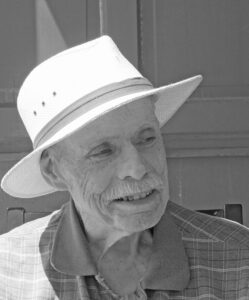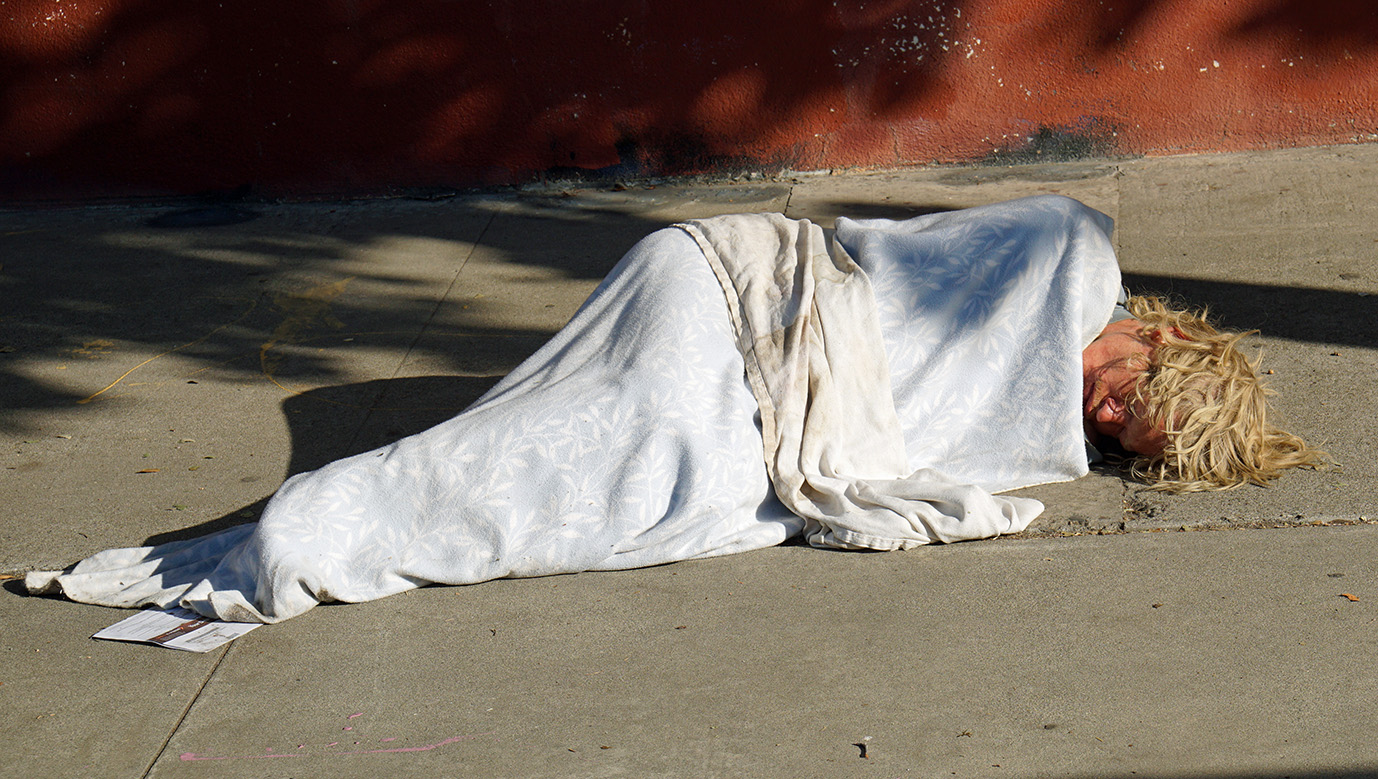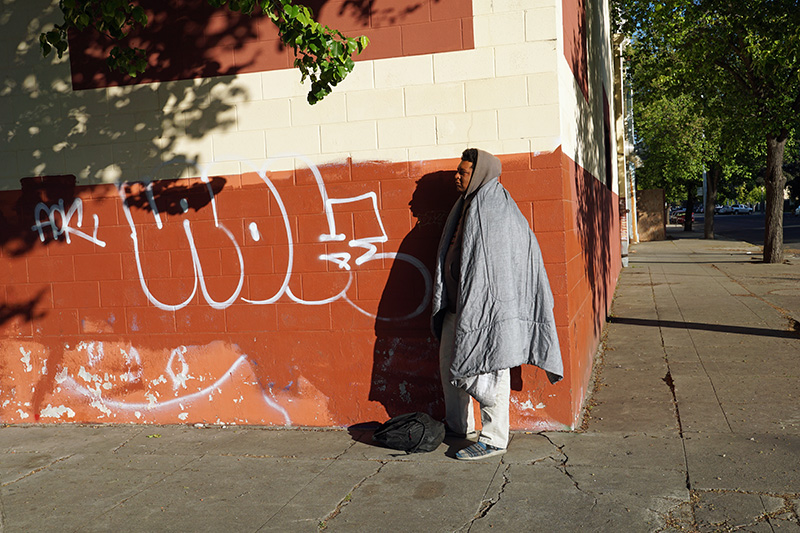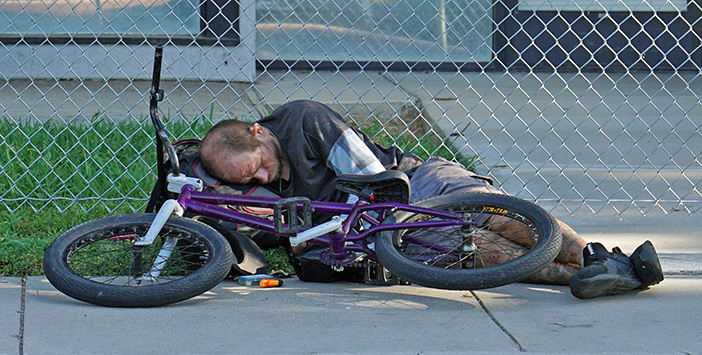
As I waited for a downtown Modesto bus one day in late April I saw a woman pushing a shopping cart jammed with her belongings. The woman was still young and athletic-looking, but weather-worn from living on the streets. Nonetheless, she carried herself with a weary gracefulness as she wheeled her cart up off the intersection of Coffee and Floyd.
We nodded briefly but companionably as the woman stopped to rest by a Starbuck’s, exhaustion and defeat visible in the lowering of her eyes to the gunning of an engine and a teenager’s derisive yell from a car. She sat on a strip of concrete bordering some landscaping and lit a cigarette – even a cigarette seemed to offer her comfort of a sort, a pause in the physical grind of the day.
How far had the woman pushed that shopping cart that day – and how much farther would she need to push it before she could find a safe resting place for the night? Where did she belong? Was she so alone that she belonged to no one but herself?
The brilliant blue sky gave forth no answers as she snuffed out the cigarette, heaved herself up from the concrete and began pushing her belongings on down Coffee Road – past where I sat, past the parking lot of the tune-up shop, only a block away from where a young man had been shot and killed one night a year ago – belonging only, it seemed, to herself and the sound of honking horns and roaring traffic – a lone, brave figure disappearing into the hubbub of the afternoon.
Every day I walk out to catch the bus I see reminders of lives ruptured by homelessness – a sleeping bag abandoned beneath a tree on Floyd Ave; a shirt or sweater lying in the dust and weeds by the convenience store; a faded blue windbreaker snarled by a brick wall next to an apartment complex. Then there was the day when I saw the ragged remains of a surplus army belt straddling the sidewalk by the car wash. Or the mix of clothes and empty McDonalds containers spilling out of a laundry basket by a bus stop half a block away from the Methodist church on I street. You’re left to wonder about the people who had held on to these items and why they abandoned them when and where they did. Sometimes, I think they are leaving little markers of their existence. It’s as if they are saying: “We are here, we are very real, please see us.”

Summertime has now arrived with a vengeance in the Northern San Joaquin Valley and a blazing sun broils down on all those spending time out on Modesto’s glaring hot sidewalks. The summer months are particularly cruel to people enduring homelessness because there’s virtually no place to hide from the heat, though sometimes you can find shade under tree for a bit, or take refuge under the eaves of a strip center in the lee of the afternoon. Unless there’s a breeze, the heat just slams right off the asphalt or the concrete and long stretches of McHenry or Yosemite or Coffee can seem almost impossible to traverse on foot, especially if you are hungry or in need of water.
We live in the wealthiest country in the world, and yet there are people starving on the streets. I live in a friendly neighborhood. But people are struggling to make a go of it within a block of where I am lucky to have a home – some of them are living on the streets already, while so many others I chat with or sit next to on the buses talk freely about the hardships they are enduring daily in their lives; the pennies they need to pinch just to make it to the end of the month; the sacrifices they need to make to pay the rent or put enough food on the table for the kiddos.
I was sitting at a bus stop on McHenry last week after a dental appointment when a fellow in his thirties sat down next to me and instantly latched onto 41 cents he found under the bench where we were sitting. He all but whooped for joy and said, grinning at me: “What can I say, Grandad? Every little bit helps!”

The next day – the last day of June – I was the lone rider on a bus from the library until we got to the corner of Coffee and Briggsmore. The bus driver told me that a lot of her regulars were probably running low on cash at the end of the month and couldn’t afford the bus fare. Let’s be clear – bus fares aren’t much – a buck for seniors, $2 for regular fare – but low as these fares are, they are definitely too high for those with limited income. Fortunately, the buses run free for everyone in July. When I needed to pick up a prescription from the pharmacy a few days later, the 32 bus was loaded with passengers running errands. As the man said – every little bit helps.
When I first moved into the neighborhood, I would often run across a fellow named Armando. Armando was a gentleman of the old school who wore a tattered beige business suit and a fedora at a jaunty angle and always greeted me with a big wave of his hand as he pulled a long wagon loaded with plastic bags filled with aluminum cans and plastic bottles – other people’s throwaways. Out on the streets, he was scrounging for a living as best he could and going about it in a bright, cheerful way.
Armando and I would always exchange pleasantries and kid each other about getting old but sadly not a bit wiser. But then I stopped seeing him. I didn’t know whether he had moved on to another neighborhood or if he had had fallen ill or something else had happened. Armando just disappeared, and to this day I think of him whenever I walk by that stretch of Coffee Road where I often saw him wheeling his cart through the parking lots.
On several occasions over the years I’ve overheard other bus riders wondering out loud about pals they used to see out on the streets or in the shelters, pals they regretted losing track of. Those conversations usually trail off with a word of hope that there friend was ok or in a better place.

A recently published UCSF study provides ample evidence that the spiraling cost of housing in our state is what is now driving homelessness in California. Many members of the activist Modesto Citizen Action Group (or MoCag) can corroborate that this is indeed the case from their own first-hand experiences of ministering to those living on Modesto’s streets.
“I’m finding new people every week, usually elderly people,” MoCag member Lynelle Loeb Solomon told me when I interviewed her recently. “And I ask them, ‘Why are you out on the streets?’ and they answer ‘Because my Social Security doesn’t cover the rise in my rent.’”
The stark economic reality is that if you are living on Social Security or SSDI — or even if you have some income beyond those sources – then the odds of finding affordable housing in this market are stacked against you. The Facebook group Renters in Stanislaus has over 7, 600 members, with the mission of matching, “responsible tenants and compassionate landlords.”
Meanwhile, MoCag members continue to doggedly fight for Tier-1 safe sleeping sites and transitional housing for the most vulnerable 440+ of our neighbors who are currently experiencing homelessness, knowing more of our neighbors will likely become unhoused with each passing day. With the summer heat just beginning, the humanitarian crisis on our community’s streets only deepens.

Hi Tom. I’m glad you’ve chosen to be another voice sharing examples of the humanitarian crisis in Modesto! Looking forward to more of your excellent reporting.
Thanks so much, Frank. Much appreciated. I’ll keep trying to do my best.
MAYOR ZWHALEN:
Everytime I see that figure 440+, I find the number so unsettling. The plus (+) seems to stand in for a great number of untold stories begging to be told.
How did our community come down from a point in time count number somewhere in the 2,000+ homeless? That question continues to beg an answer.
When walking or riding through our city streets, there are what seems to be, so many more signs of lost souls, than 440+.
How did you come about the figure: 440+ that so easily rolls out from some minds? Is that an accurate number or does it sound better than the accurate number? As for me, my mind is not at peace with it
When I used the words “lost souls,” they, by themselves, cry out for a more definitive telling.
Mayor Zwhalen, I direct these cries to you, these begging questions to you, for answers…
I watch you weekly on screen. I look for tell tale signs that you are in any way discomforted, discomfited, while you conduct city business, banging your little gavel down, in between shuffling papers, and counting votes, that there are the 440+ lost souls stumbling about in and under your purview. Do you find yourself compartmentalizing those lost souls to some dark recesses of your mind because you think you have more pressing busyness, than finding a viable solution for the suffering living beings, wondering your streets, seeking a resting place?
Do you know the disdain is written all over your body when families of killed loved ones phone in to confront you with what you are going to do to solve their pains, besides listen to them for 3 whole minutes a piece, week after empty week?
Do you intend to do anything for them that could ease their pain in some way? Do you sincerely hear their voices crying out? I ask because if you cannot hear those voices, than you cannot possibly hear the silent voices screaming out to you from Modesto city streets. Than you cannot possibly hear the entire city of Modesto’s streets begging for answers from you, Sue.
Are you able to hear, feel, act, or, are you numb and devoid of fellow feeling? You wanted to be Modesto’s Mayor, while you had no choice but to know, you would be responsible and obligated to end the many sufferings of the homeless. Are you Mayor, in vain? Merely taking up space? Or do you intend to do something that makes your title, worthy? I expect more from you. I am not alone!
Mayor Zwhalen,
I have an after thought.
Modesto, CA has some catching up to do with other States and/or other communities. The below link details best what I perceive could be done for housing right here in Modesto. I am certain I am not the only one to think such.
If you would be so kind as to do your own research, you should be able to see tiny home communities are, also, being built for homeless individuals and homeless families.
I am certain there are hundreds, and likely thousands, of people who would appreciate a way to own their own tiny home, and pay monthly costs they can afford. Rather than pay someone else’s mortgage, that they cannot afford, for a home owner who just as sure as I am writing to you, Sue, will start an eviction process on them as soon as they can no longer pay the entire rent, if they do not “just leave.” Then where do they go?
Thanklessly, at that, because for some odd reason that I cannot figure out, they think they are more worthy than renter(s).
Times have changed, costs have risen, home owners had it nice for themselves, while things have lasted, but that is over now. Life moved on.
without taking them into consideration, or renters, by the looks of it…
You are being called to task. You must, Sue, or another Mayor must, provide housing. Plain and simple:
https://coloradosun.com/2023/07/11/tiny-home-rules-veterans-housing-colorado/
The above article is not only for veterans, yet, God knows vets located everywhere need an assist as well as any other priced out human being.
Thank you, for your effort
[…] Story continues […]
ROUGH SLEEPERS, is a non-fiction book, by Tracy Kidder, a well known author. Rough Sleepers is a name coined in Europe denoting people who were or are homeless. This book centers around Boston, MA, where I once hailed from.
Review on Amazon: A Must Read https://www.amazon.com/gp/aw/review/B0B315BKNW/R3UR043C1M0T6K?ref_=cm_sw_r_em_mwn_dprv_7PRA33C5WAFR79JEKWCC
Thanks so much for the book recommendation – sounds like a book well worth reading.
I to wonder where are all the homeless coming from . There are new ones every day all throughout Modesto. Some sleep in their cars in parking lots while others sleep wherever they can.
My concerns are the trash let by them and that the City of Modesto is doing nothing about it.
Where is the Mayor? You don’t hear from her or hardly see her.
Time to come up with a plan to clean up Modesto before it’s too late.